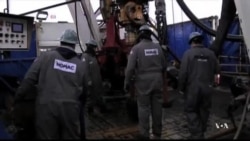LONDON —
As Russia and the West enact tit-for-tat sanctions over Moscow’s annexation of Crimea, European leaders meeting in Brussels are discussing ways to reduce the continent’s dependence on Russian gas imports. Europe buys around 30 percent of its gas from Russia, and many EU leaders fear that trade gives Moscow too much leverage.
Engineers operate a shale gas facility in Pennsylvania - one of dozens of hydraulic fracturing or ‘fracking’ sites across the United States that have made it the world’s top natural gas producer.
Europe hopes this could be the long-term answer to countering its dependence on Russian gas.
European leaders want the U.S. to start shipping shale gas across the Atlantic as Liquefied Natural Gas or LNG.
At talks in Brussels on the proposed EU-U.S. free trade deal last week, EU trade commissioner Karel De Gucht said energy was high on the agenda.
He says Europe is too dependent on foreign countries for its energy needs, especially from Russia, and there is no easy solution. But he says he will negotiate with the United States to import shale gas.
Analysts point to many obstacles. Transport costs mean the price of LNG is higher than Russian gas.
U.S. opponents of the idea say the cheap shale gas should not be exported because it gives American industry a competitive advantage.
Still, energy diversification is key to changing Europe’s geopolitical relationship with Russia, says Professor Alan Riley of City University London.
“Completing the single market in gas, and bringing gas from Qatar as LNG, potentially U.S. LNG over the next few years making its way across Europe, switching to coal," he said. "There’s a lot of use of coal now, U.S. coal, which has been displaced in the U.S. because of shale gas, pouring into Europe. There are lots of options."
Russia’s actions in Ukraine have taken Europe by surprise - and will likely intensify efforts to look elsewhere for gas, says Ian Bond of policy group the Center for European Reform.
“Also to look at other sources like Qatar and Algeria, so sources of Liquefied Natural Gas. And maybe even in the slightly longer term to persuade the Germans to turn their nuclear power stations back on, which would sharply reduce the demand for Russian gas," he said.
In June last year Greece signed a deal to bring a pipeline from Azerbaijan’s gas fields into the European Union - providing a direct alternative to Russian imports. But the so-called Trans Adriatic Pipeline or TAP won’t come online until 2019.
The range of alternatives give Europe leverage, says Ian Bond.
“Russia depends very heavily on the revenues from the gas that it sells to Europe. At least half of the national state budget comes from sales of hydrocarbons to Europe," he said. "And although in the winter it would be true that Europe would freeze before Gazprom would go bankrupt, in the summer Europe has more levers."
But many analysts caution that price remains the deciding factor for many European gas buyers. And Russia still offers the cheapest energy - even if Europe disapproves of Moscow’s politics.
Engineers operate a shale gas facility in Pennsylvania - one of dozens of hydraulic fracturing or ‘fracking’ sites across the United States that have made it the world’s top natural gas producer.
Europe hopes this could be the long-term answer to countering its dependence on Russian gas.
European leaders want the U.S. to start shipping shale gas across the Atlantic as Liquefied Natural Gas or LNG.
At talks in Brussels on the proposed EU-U.S. free trade deal last week, EU trade commissioner Karel De Gucht said energy was high on the agenda.
He says Europe is too dependent on foreign countries for its energy needs, especially from Russia, and there is no easy solution. But he says he will negotiate with the United States to import shale gas.
Analysts point to many obstacles. Transport costs mean the price of LNG is higher than Russian gas.
U.S. opponents of the idea say the cheap shale gas should not be exported because it gives American industry a competitive advantage.
Still, energy diversification is key to changing Europe’s geopolitical relationship with Russia, says Professor Alan Riley of City University London.
“Completing the single market in gas, and bringing gas from Qatar as LNG, potentially U.S. LNG over the next few years making its way across Europe, switching to coal," he said. "There’s a lot of use of coal now, U.S. coal, which has been displaced in the U.S. because of shale gas, pouring into Europe. There are lots of options."
Russia’s actions in Ukraine have taken Europe by surprise - and will likely intensify efforts to look elsewhere for gas, says Ian Bond of policy group the Center for European Reform.
“Also to look at other sources like Qatar and Algeria, so sources of Liquefied Natural Gas. And maybe even in the slightly longer term to persuade the Germans to turn their nuclear power stations back on, which would sharply reduce the demand for Russian gas," he said.
In June last year Greece signed a deal to bring a pipeline from Azerbaijan’s gas fields into the European Union - providing a direct alternative to Russian imports. But the so-called Trans Adriatic Pipeline or TAP won’t come online until 2019.
The range of alternatives give Europe leverage, says Ian Bond.
“Russia depends very heavily on the revenues from the gas that it sells to Europe. At least half of the national state budget comes from sales of hydrocarbons to Europe," he said. "And although in the winter it would be true that Europe would freeze before Gazprom would go bankrupt, in the summer Europe has more levers."
But many analysts caution that price remains the deciding factor for many European gas buyers. And Russia still offers the cheapest energy - even if Europe disapproves of Moscow’s politics.





